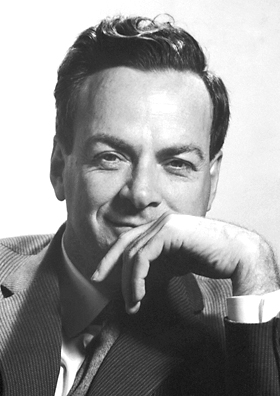Howdy, Stranger!
It looks like you're new here. If you want to get involved, click one of these buttons!
If you have an email ending in @hotmail.com, @live.com or @outlook.com (or any other Microsoft-related domain), please consider changing it to another email provider; Microsoft decided to instantly block the server's IP, so emails can't be sent to these addresses.
If you use an @yahoo.com email or any related Yahoo services, they have blocked us also due to "user complaints"
-UE
If you use an @yahoo.com email or any related Yahoo services, they have blocked us also due to "user complaints"
-UE
Richard Feynman

Well, someone only has to give me the principle, and I get the idea. All during the next day I built up my psychology differently: I adopted the attitude that those bar girls are all bitches, that they aren't worth anything, and all they're in there for is to get you to buy them a drink, and they're not going to give you a goddamn thing; I'm not going to be a gentleman to such worthless bitches, and so on. I learned it till it was automatic.


Comments
Which of course, excuses everything.
Of course it doesn't. But your excerpt was pretty out-of-context.
I am playing a wacky prank. It is what Feynman would want.
But seriously though, I need to PM YOU ABOUT SOMETHING NICE
So it is a social experiment?
That is pretty unreadable.
It is kind of interesting how the general public only knows certain famous physicists but not others who made plenty of contributions, but I guess it isn't too surprising. I don't know every famous person in every field that isn't my own after all.
One over-looked physicist I like is Hans Bethe, who made fundamental contributions to nuclear theory in the 30'ies and 40'ies and made fundamental contributions to the understanding of supernovae in the 80'ies and 90'ies (and a whole bunch of other stuff in between of course). He wrote a seminal paper on the supernova problem when he was 85 years old. He basically kept doing physics relevant to current research to the very end, which was when he was 98. That's pretty cool.
Of course I've always been kind of fascinated by the early quantum mechanics pioneers, who are generally more well-known. Ever since I read a really interesting book by Heisenberg which was part memoir, part musings on the past and the nature of scientific discourse. The descriptions of the environment surrounding Niels Bohr, the descriptions of the various discussions he had with Schrödinger, Dirac, Pauli and the aforementioned Bohr (which was by no means limited to physics). All very interesting stuff. I guess I have a bit of a soft spot for this period, because they all came off as very educated in general, whether as some modern physicists seem to be much less so. Well I guess Dirac was more along the lines of your stereotypical "the only thing that matters is physics" kind of guy, but he was so in a rather interesting and spectacular fashion. There are plenty of funny stories about his extreme devotion to precision.
This is of course not to slight Einstein for example who was also a very interesting character.
Of course the physicists nobody in the west seems to know are often russians, a lot of whom have actually done a lot of excellent work. Landau is a good example from the 50'ies. I have a lecturer at my university who likes to joke that everything has already been discovered in some obscure journal of mathematical physics in Russia 5 years before it is generally discovered. It's just that nobody could understand the arcane way in which the math was written and only realises what it means after having discovered the physics of it independently.
I own a handbook by Landau. When recently in some TVT thread I saw complaints on old handbooks, I immediately thought of Landau's physics handbooks, which are still held in high regard despite being written as early as in the Forties.
While we're at it, I've heard fullerenes and carbon nanotubes have been discovered plenty of times over the course of thirty years, and it was only that last time when the discoverer didn't dismiss it as a minor curiosity and didn't publish his results in obscure Russian or Japanese journals.
Also, because of his name he was included in the Alpher-Bethe-Gamow paper.
^Ok, that is pretty awesome too.
^^I've read the first volume in his course of theoretical physics, the one on classical mechanics (a translated version of course, I don't speak Russian). I actually really liked that book, because it is very concise and really empathises the underlying symmetries of classical mechanics, which is nice when one is used to seeing everything in terms of symmetries from quantum field theory. Yes I know that my learning order is somewhat backwards. I've been thinking about looking at some of the other books from the series, however unlike the mechanics one they are probably a little dated.
I've been thinking about looking at some of the other books from the series, however unlike the mechanics one they are probably a little dated.
Actually I just think it's really cool how closely analytical mechanics resemble quantum mechanics. The Hamilton equations are basically the same as the Heisenberg equations of motion, if you just use poisson brackets instead of commutators. It even has a canonical relation, which together with the fact that it fulfils basically the same algebra as the commutator leads to so many of the well-known relations from quantum mechanics. My mind was kind of blown.
The Lagrangian is obviously the fundamental object of most modern quantum field theory as well.
One does kind of wonder why courses in analytical mechanics are often given so late, but I guess I can do the opposite of what one did historically, draw parallels to my quantum mechanics knowledge.
I had my classical mechanics on the second year, and quantum the following semester.
But you know what, this is the moment when we can make a circle and go back to the hero of this thread. Feynman, I remember, touched the topic you speak of, the same equations appearing again and again in various contexts. I mean, in his own lectures, you probably know these handbooks well. More on the popular side than Landau, but the content's in there.
Yeah, I've also read that Feynman was very fascinated with the principle of least action from classical mechanics, which lead to his reformulation of quantum mechanics in terms of path integrals (that and, according to the book we used for advanced quantum mechanics, trying to make sense of a mysterious remark/equation by Dirac in one of his books).
I had a russian lecturer at some point (actually he was also my supervisor for my bachelor's project, but I digress) who has lived here (Denmark) for many years and he would tell this story about Niels Bohr visiting Russia: One of the guys at the conference apparently asked why so many of his students went on to do great things. To which he answered that it was because he wasn't afraid to let his students see him as wrong. Which in translation became "It's because I'm not afraid to tell my students that they are wrong". My lecturer didn't think that it was a simple mistranslation.
I was once on a lecture by, well, technically an Ukrainian professor, but it wasn't relevant when he was a student. Pretty chill fellow. Joked about his mandatory education in Marxism-Leninism. Which brings me back to the old handbook issue, I once read a handbook starting with an explanation that quantum mechanics are technically consistent with the teachings of Lenin. When I was just about to lol out, one of my buddies told me it's one of the best handbooks he's ever had. No leaps of logic, everything clearly coming from what's been before, so on. Fun how these things work out, heh heh.
Yeah. It is fun.